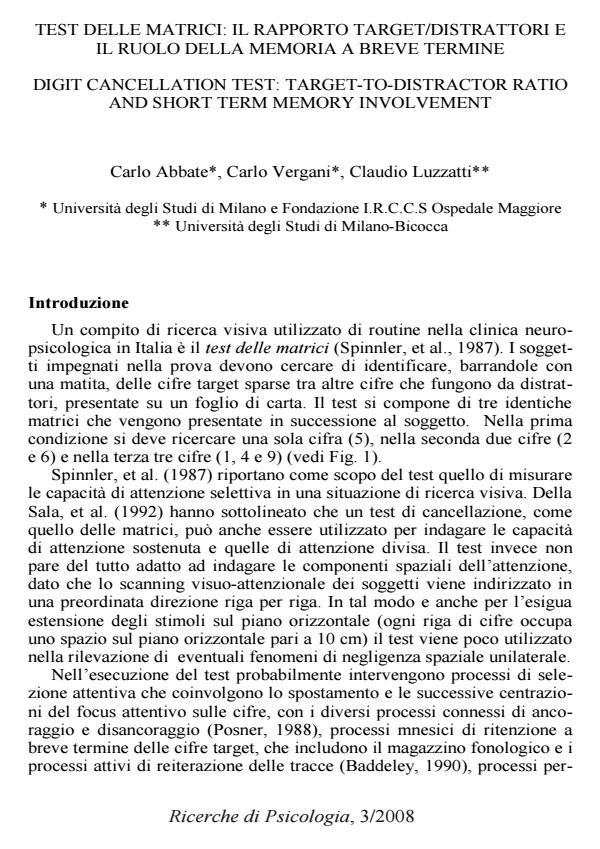Test delle matrici: il rapporto target/distrattori e il ruolo della memoria a breve termine
Journal title RICERCHE DI PSICOLOGIA
Author/s Claudio Luzzati, Carlo Abbate, Carlo Vergani
Publishing Year 2009 Issue 2008/3
Language Italian Pages 18 P. 29-46 File size 674 KB
DOI 10.3280/RIP2008-003002
DOI is like a bar code for intellectual property: to have more infomation
click here
Below, you can see the article first page
If you want to buy this article in PDF format, you can do it, following the instructions to buy download credits

FrancoAngeli is member of Publishers International Linking Association, Inc (PILA), a not-for-profit association which run the CrossRef service enabling links to and from online scholarly content.
Digit cancellation test: target-to-distractor ratio and short term memory involvement - We studied the effect of the target-to-distractor ratio (T/D) and short term memory on a matrix test performance. Higher performance on a visual search test with rising T/D ratio was found. An overall performance score improvement from the first to the third matrix is expected, because of the T/D ratio increase. In a previous study we found a significant difference on accuracy scores between the first and the following matrixes. In this article we demonstrate that an involvement of the short term memory processes could account for this result. Two hundred and twenty seven subjects from the Geriatric Unit of Ospedale Policlinico of Milan were considered. The subjects were 159 female and 68 male, aged 58 to 94 years with 3 to 18 years of education. Patients suffering from acute or chronic neurological diseases, sensorial impairment and alcoholism were excluded. We examined retrospectively the performance obtained by the subjects on a matrix test and a bisyllabic words span test. Correlation between accuracy scores obtained for the different matrixes of the attention test and the span score was then calculated. We found: 1) a significant difference on overall performance score between the three matrixes of the attention test: scores increase with the rise of T/D ratio; 2) a significant correlation between the accuracy score of the second and third matrix and the score of the span test; 3) no correlation between accuracy scores on the first matrix and the short-term memory score. In conclusion our data confirm the positive effect of a larger target-to-distractor ratio on the visual search performance in elderly people. The hypothesis that short-term memory is involved in the execution of the second and third matrix is preliminarly confirmed. The results are discussed in terms of the signal detection theory.
Claudio Luzzati, Carlo Abbate, Carlo Vergani, Test delle matrici: il rapporto target/distrattori e il ruolo della memoria a breve termine in "RICERCHE DI PSICOLOGIA " 3/2008, pp 29-46, DOI: 10.3280/RIP2008-003002